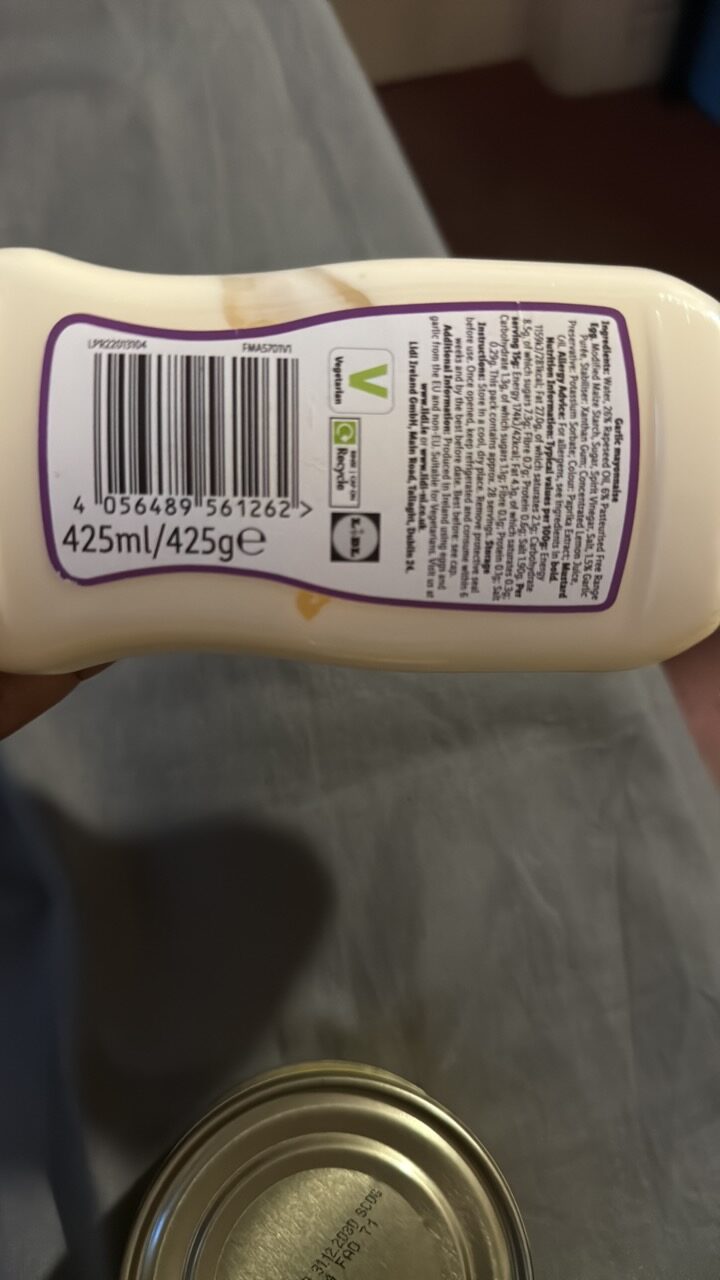
Barcode: 056418565280
Garlic mayonnaise
HALAL
📝 Reason: Based on ingredient analysis, there are no explicitly Haram (forbidden) ingredients such as pork, alcohol, or specific Haram E-codes (E120, E124, E354, E999). However, unspecified ingredients like ‘stabiliser’, ‘preservative’, and ‘colour’ are classified as Doubtful due to the possibility of animal or Haram-derived sources, and lack of certification or details. According to Qur’an 5:3 and international Halal bodies such as IFANCA, Muslims must avoid doubtful (shubha) items unless clear, verifiable information on source or Halal certification is provided. For this product, since some ingredients are Doubtful (2), Halal_Result is 2.
🏷️ Category: Mayonnaise
📄 Certificates: Vegetarian, Recycle, 425Ml/425Ge, Vegetarisch
Ingredients:
Details
Understanding the Halal Status of Garlic Mayonnaise
Garlic mayonnaise is a delicious condiment enjoyed by many, but for those following a Halal diet, knowing its Halal status is crucial. In this article, we will explore the ingredients of Garlic Mayonnaise and verify its compliance with Halal dietary laws.
Halal Certification and Primary Ingredients
According to the information available, Garlic Mayonnaise is classified as HALAL. This conclusion is based on a thorough analysis of its ingredients, which includes: water, rapeseed oil, pasteurized free-range egg, modified maize starch, sugar, spirit vinegar, salt, garlic purée, stabiliser, xanthan gum, concentrated lemon juice, preservative, potassium sorbate, colour, paprika extract, and mustard.
Ingredient Analysis
Let’s break down the ingredients one by one to understand their Halal status:
- Water: Pure water is inherently Halal and contains no Haram elements.
- Rapeseed Oil: Typically Halal, vegetable oils like rapeseed oil are acceptable unless processed with Haram additives, which is not specified here.
- Pasteurized Free Range Egg: Eggs from Halal animals, such as chickens, are Halal unless contaminated with Haram materials.
- Modified Maize Starch: Derived and processed from maize (corn), it is Halal unless specific additives are Haram.
- Sugar: Generally Halal, although it can be processed with animal-based filters—no such processing information was found here.
- Spirit Vinegar: Acceptable after fermentation, spirit vinegar is considered Halal when no alcohol remains.
- Salt: As a mineral, salt is inherently Halal.
- Garlic Purée: This natural product is Halal as well.
- Stabiliser: Unspecified stabilisers can come from either plant or animal sources, hence deemed Doubtful without details.
- Xanthan Gum: Generally produced by fermentation, xanthan gum is Halal.
- Concentrated Lemon Juice: Being plant-derived, lemon juice is Halal.
- Preservative: The term ‘preservative’ is vague and may include both Halal and Haram types, resulting in a Doubtful classification.
- Potassium Sorbate (E202): Recognized as Halal, it’s made from neutralizing sorbic acid with potassium hydroxide.
- Colour: Generic, this could contain both Halal and Haram colorants; therefore, it is labeled as Doubtful.
- Paprika Extract: Derived from bell peppers, it is Halal.
- Mustard: This seed-derived product is also Halal.
Conclusion: Is Garlic Mayonnaise for You?
While Garlic Mayonnaise is primarily Halal based on its ingredients, there are some Doubtful components, such as the stabiliser, preservative, and colour. According to Islamic scholars and bodies like IFANCA, it is essential to avoid doubtful ingredients unless you have clear and verified information about their sources or Halal certifications.
If you are keen on consuming Garlic Mayonnaise, it would be prudent to look for products with clear Halal certification. Always check labels for certifications, especially for vendors that provide transparency about their ingredients.
In summary, while this product is labeled as HALAL, be aware of the Doubtful ingredients and proceed with caution, especially if you are strict about your dietary choices.
